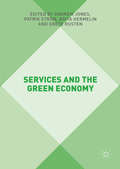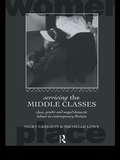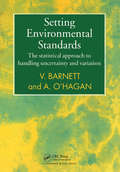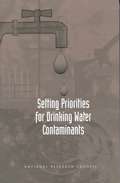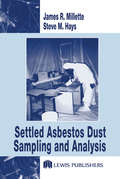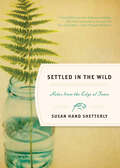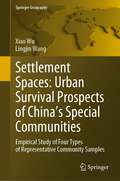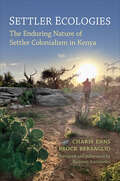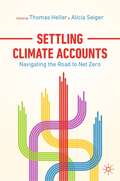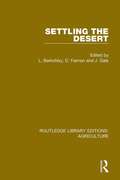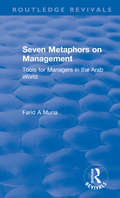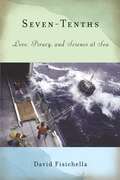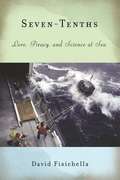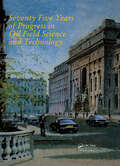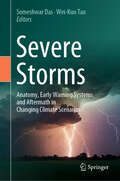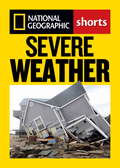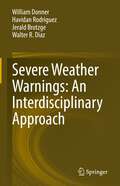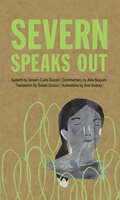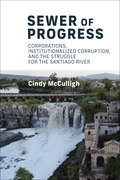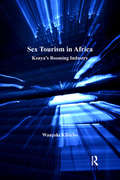- Table View
- List View
Services and the Green Economy
by Andrew Jones Patrik Ström Brita Hermelin Grete RustenServices and the Green Economy addresses a significant gap in theknowledge and understanding of sustainable economic development. Bringingtogether a range of expert contributions the book analyses the role of servicesand service industries in the transition to a greener economy. Framed by anapproach within environmental economic geography, chapters written by leadingresearchers from a range of disciplines explore how service industries, servicefirms and service activities are at heart of green economic processes. Adoptinga global perspective, it includes research from the US, Europe, South Americaand Japan, providing a detailed insight into how the crucial role of serviceindustry activity has often been ignored in current understandings of a greeneconomic transition.
Servicing the Middle Classes: Class, Gender and Waged Domestic Work in Contemporary Britain (Routledge International Studies of Women and Place)
by Michelle Lowe Nicky GregsonServicing the Middle Classes investigates the recent rise in demand by middle class families for waged domestic labour and the consequent growth of a new `servant' class.Examining the position of nannies and cleaners, the authors explore the national socio-economic trends which have led to this new phenomenon and the profound changes this reflects in our concepts of motherhood and class and gender relations.
Setting Environmental Standards: The Statistical Approach to Handling Uncertainty and Variation
by Vic Barnett A. O'HaganIntroducing a novel approach to setting environmental pollution standards that allow for proper treatment of uncertainty and variation, this book surveys the forms of standards and proposes a new kind of "statistically verifiable ideal standard."Setting Environmental Standards includes:a current analysis regarding the treatment of uncertainty and variation in environmental standard settinga review of basic principles in standard setting, including costs, actions and effects, and benefitsexamples where uncertainty and variation have been well-treated in current practice as well as examples where clear deficiencies are apparentspecific proposals for the future approach to setting environmental pollution standards - encompassing the anticipated elements of uncertainty and variabilityThe issues discussed serve statisticians as well as those persons involved with environmental standards. Scientists in agencies responsible for setting standards, in organizations advising such agencies or working in industries subject to these standards, will find Setting Environmental Standards an invaluable reference.
Setting Priorities for Drinking Water Contaminants
by National Research CouncilThe provision of safe drinking water has been an important factor in the improvement of the health status of U.S. communities since the turn of the last century. Nonetheless, outbreaks of waterborne disease and incidences of chemical contamination of drinking water continue to occur.Setting Priorities for Drinking Water Contaminants recommends a new process for the U.S. Environmental Protection Agency to use in deciding which potential drinking water contaminants should be regulated in public water supplies to provide the greatest protection against waterborne illnesses. The book covers chemical and microbiological contaminants and includes a historical review of past approaches to setting priorities for drinking water contaminants and other environmental pollutants. It emphasizes the need for expert judgment in this process and for a conservative approach that considers public health protection as the first priority.
Settled Asbestos Dust Sampling and Analysis
by Steve M. Hays James R. MilletteSettled Asbestos Dust Sampling and Analysis compiles the most significant data on asbestos in settled dust. This ready reference presents an analysis of settled dusts and surface particles of all sizes for asbestosthat is useful for qualitative and quantitative assessment and helps to determine the source of fibers. The main scope of this reference includes sample collection, sample analyses, and interpretation of settled dust data, as well as the use of such data for purposes including asbestos abatement projects and in-place management programs. Sections on lead and other particulates are also included.
Settled in the Wild: Notes from the Edge of Town
by Susan Hand ShetterlyWhether we live in cities, suburbs, or villages, we are encroaching on nature, and it in one way or another perseveres. Naturalist Susan Shetterly looks at how animals, humans, and plants share the land—observing her own neighborhood in rural Maine. She tells tales of the locals (humans, yes, but also snowshoe hares, raccoons, bobcats, turtles, salmon, ravens, hummingbirds, cormorants, sandpipers, and spring peepers). She expertly shows us how they all make their way in an ever-changing habitat. In writing about a displaced garter snake, witnessing the paving of a beloved dirt road, trapping a cricket with her young son, rescuing a fledgling raven, or the town's joy at the return of the alewife migration, Shetterly issues warnings even as she pays tribute to the resilience that abounds. Like the works of Annie Dillard and Aldo Leopold, Settled in the Wild takes a magnifying glass to the wildness that surrounds us. With keen perception and wit, Shetterly offers us an education in nature, one that should inspire us to preserve it.
Settlement Spaces: Empirical Study of Four Types of Representative Community Samples (Springer Geography)
by Xiao Wu Lingjin WangThis book examines the settlement space of special communities in China on the community scale from an interdisciplinary approach that combines perspectives from urban planning and sociology. Using the framework of integration response, it theoretically and empirically explores the approaches these communities adopt to survive and evolve. Empirically, this discussion centers on four particular groups, namely international students, land-lost peasants, ethnic minorities, and migrant workers, and offers an analysis of their settlement spaces from different perspectives. Theoretically, this study optimizes the logic of one-way integration as used in classical theories. By constructing a two-way linkage in the theoretical framework of integration response, it provides a multi-scenario interpretation and summary of the laws of survival and evolution that govern the urban settlements of special communities in China. This study conforms to the major transformations that China has undergone in the concepts, models, and orientation of its development since the 18th National Congress of the Chinese Communist Party. Furthermore, it renders profound research value and bears practical significance for the adjustment and management of urban spatial patterns in China, social care for marginalized groups, and the construction of a harmonious and moderately prosperous society. This study provides valuable reference for educators, researchers, and management personnel across various fields, including urban planning, geography, and sociology.
Settler Ecologies: The Enduring Nature of Settler Colonialism in Kenya
by Charis Enns Brock BersaglioSettler Ecologies tells the story of how settler colonialism becomes memorialized and lives on through ecological relations. Drawing on eight years of research in Laikipia, Kenya, Charis Enns and Brock Bersaglio use immersive methods to reveal how animals and plants can be enrolled in the reproduction of settler colonialism. The book details how ecological relations have been unmade and remade to enable settler colonialism to endure as a structure in this part of Kenya. It describes five modes of violent ecological transformation used to prolong structures of settler colonialism: eliminating undesired wild species; rewilding landscapes with more desirable species to settler ecologists; selectively repeopling wilderness to create seemingly more inclusive wild spaces and capitalize on biocultural diversity; rescuing injured animals and species at risk of extinction to shore up moral support for settler ecologies; and extending settler ecologies through landscape approaches to conservation that scale wild spaces. Settler Ecologies serves as a cautionary tale for future conservation agendas in all settler colonies. While urgent action is needed to halt global biodiversity loss, this book underscores the need to continually question whether the types of nature being preserved advance settler colonial structures or create conditions in which ecologies can otherwise be (re)made and flourish.
Settling Climate Accounts: Navigating the Road to Net Zero
by Thomas Heller Alicia SeigerAs drivers of climate action enter the fourth decade of what has become a multi-stage race, Net Zero has emerged as the dominant organizing principle. Hundreds of corporations and investors worldwide, together responsible for assets in the tens of trillions of dollars, are lining-up for the UN Race to Zero. This latest stage in the race to save civilization from heat, drought, fires, and floods, is defined by steering toward zeroing out greenhouse gas emissions by 2050. Settling Climate Accounts probes the practice of Net Zero finance. It elucidates both the state of play and a set of directions that help form judgements about whether Net Zero is going to carry climate action far enough. The book delves into technical analyses and activates the reader’s imagination with narrative accounts of climate action past, present, and future. Settling Climate Accounts is edited and authored by Stanford University faculty and researchers. The first part of the book investigates the rough edges of Net Zero in practice, exploring questions of hedging risk, Scope 3 emissions, greenwashing, and the business of asset management. The second half looks at states, markets, and transitions through the lenses of blended finance, offsets, debt, and securitization. The editors tease out possible solutions and raise further questions about the adequacy and reach of the Net Zero agenda. To effectively navigate the road ahead, the editors call out the need for accountability and ask: who is in charge of making Net Zero add up? Settling Climate Accounts offers context and foundation to ground the rapidly evolving practice of Net Zero finance. Targeted at seasoned practitioners, newly activated leaders, educators, and students of climate action the world over, this book embraces the complexity of climate action and, in so doing, proposes to animate and drive hope.
Settling Nature: The Conservation Regime in Palestine-Israel
by Irus BravermanA study of Palestine-Israel through the unexpected lens of nature conservation Settling Nature documents the widespread ecological warfare practiced by the state of Israel. Recruited to the front lines are fallow deer, gazelles, wild asses, griffon vultures, pine trees, and cows—on the Israeli side—against goats, camels, olive trees, hybrid goldfinches, and akkoub—which are affiliated with the Palestinian side. These nonhuman soldiers are all the more effective because nature camouflages their tactical deployment as such.Drawing on more than seventy interviews with Israel&’s nature officials and on observations of their work, this book examines the careful orchestration of this animated warfare by Israel&’s nature administration on both sides of the Green Line. Alongside its powerful protection of wildlife biodiversity, the territorial reach of Israel&’s nature protection is remarkable: to date, nearly 25 percent of the country&’s total land mass is assigned as a park or a reserve. Settling Nature argues that the administration of nature advances the Zionist project of Jewish settlement and the corresponding dispossession of non-Jews from this space.
Settling the Desert (Routledge Library Editions: Agriculture #16)
by L. Berkofsky D. Faiman J. GaleFirst published in 1981. Settling the Desert is an attempt to organise those aspects of scientific and sociological research that are the necessary prerequisites for making the desert a comfortable and profitable place for man to inhabit. In this book, experts from many fields of desert research review the history of desert settlement and agriculture, as well as the present problems encountered by modern desert settlers. Topics discussed include: meteorology, sociology, ecology, water resources, solar energy, innovative desert agriculture, architecture, and animal science.
Seven Fundamental Concepts in Spacetime Physics (SpringerBriefs in Physics)
by Vesselin PetkovThe book presents seven fundamental concepts in spacetime physics mostly by following Hermann Minkowski’s revolutionary ideas summarized in his 1908 lecture "Space and Time." These concepts are: spacetime, inertial and accelerated motion in spacetime physics, the origin and nature of inertia in spacetime physics, relativistic mass, gravitation, gravitational waves, and black holes. They have been selected because they appear to be causing most misconceptions and confusion in spacetime physics.
Seven Fundamental Concepts in Spacetime Physics (SpringerBriefs in Physics)
by Vesselin PetkovThe book presents seven fundamental concepts in spacetime physics mostly by following Hermann Minkowski’s revolutionary ideas summarized in his 1908 lecture "Space and Time." These concepts are: spacetime, inertial and accelerated motion in spacetime physics, the origin and nature of inertia in spacetime physics, relativistic mass, gravitation, gravitational waves, and black holes. They have been selected because they appear to be causing most misconceptions and confusion in spacetime physics. This second edition has been revised to include additional clarifications, more detailed elaboration of the arguments and also new material published in the interim.
Seven Metaphors on Management: Tools for Managers in the Arab World
by F. MunaThis title was first published in 2003. This text covers seven management metaphors that have been of great value to the author and his clients over the years in his roles as a father, manager and management trainer. Some chapters contain checklists or guidelines for action; others have short hypothetical case studies woven into the writing. These demonstrate either the principle ideas or how to use the metaphors as managerial tools. Many of the anecdotes and examples used in the book are drawn from the author's personal experience and consulting assignments in the West and the Arabian Gulf. The book is written with the practicing manager in mind. It contains many references to well-known publications but does not have an academic tone. In brief, the book summarizes up-to-date research findings and trends on a number of people management topics. It also describes the trends in management styles and practices in the Arabian Gulf over a period of 30 years, based on field research carried out in 1980, 1989 and 2002.
Seven-Tenths
by David FisichellaAn engineer whose life is in shambles meets a blind oceanographer who spends her life at sea. In this memoir of their courtship, David Fisichella writes of science, love, adventure, and danger on the ocean. He survives heavy weather, an equator crossing, and a pirate attack off the coast of Somalia. He learns how scientists study ocean physics and why their research is so important, how people live for months on a crowded boat, and what it means to be working for, and dating, the chief scientist. Told with humor, gritty details, and a refreshing sense of wonder about our oceans.
Seven-tenths: Love, Piracy, and Science at Sea
by David FisichellaA disillusioned man and a blind oceanographer find love and adventure while studying the world's oceans.
Seventy Five Years of Progress in Oil Field Science and Technology: Proceedings of the 75th anniversary symposium, London, 12 July 1988
by M.ALA; H.HATAMIAN; G.D.HOBSON; M.S.KING; I.WILLIAMSONThis volume contains the proceedings of the 75th anniversary of Progress in Oil Field Science and Technology as gathered at the symposium in London on 12th July 1988.
Severe Storms: Anatomy, Early Warning Systems and Aftermath in Changing Climate Scenarios
by Wei-Kuo Tao Someshwar DasThe book provides information on the observational aspects of the severe storms through satellite, radar, aircraft, and ground based network of stations and these issues are discussed in the first part of the book consisting of 8 chapters. The numerical modelling and data assimilation techniques are discussed in the second part of the book aimed at development of Early Warning Systems (12 chapters) and finally the outlook of the severe storms in a changing climate scenario, their socio-economic impacts and policies for disaster mitigation are discussed in the third part of the book consisting of 6 chapters. This book is of great interest to atmospheric scientists and other researchers, practitioners, policy and decision makers, international institutions, governmental and non-governmental organizations, educators, as well as students.
Severe Weather
by National GeographicSevere weather events like hurricanes and tornadoes have increased fourfold in the last two decades, shaking the foundations of our existence. Weather-related tragedies have fascinated humans throughout time. For those who loved The Perfect Storm andKrakatoa, the millions who log onto daily weather forecasting sites and check weather apps, and people who can't get enough front-page headlines of global natural disasters.Earthquakes, hurricanes, tornados, floods, forest fires, blizzards, and thunderstorms: National Geographic explores the deadliest of these disasters throughout history and arms you with ways to protect yourself from chaos and destruction. From the 1906 earthquake that flattened San Francisco and the morbid 1889 flash flood that wiped out the entire town of Johnstown, Pennsylvania, to the Superstorm of 1993 that blanketed Florida in snow and the more recent East Coast and Gulf Coast ravages of hurricanes Katrina and Sandy, the destructive force and human tragedy both fascinates and horrifies. In addition to these gripping stories, NGS provides practical tips for surviving at home and weathering the lethal strength of these events if caught outside.
Severe Weather Warnings: An Interdisciplinary Approach
by William Donner Havidan Rodriguez Jerald Brotzge Walter R. DiazThis book offers a comprehensive description and analysis of natural hazard warnings, drawing on perspectives from the social sciences, physical sciences, and interdisciplinary fields such as disaster studies to articulate a distinction between traditional warnings and what might be called interdisciplinary warnings. Traditional warnings approach warning technology, design, and application from a principally scientific and technical perspective. Human factors, while considered, often are of secondary concern. Interdisciplinary warnings, on the other hand, maintain a critical emphasis on the technical merits of warning systems, but also ask, “Will psychological and community factors such as culture and structure shape how the system is used, and, if so, can this information be incorporated into system design preemptively to make it more effective?” Given the absence of systematic work on interdisciplinary warnings, a book-length monograph discussing and synthesizing knowledge from the various fields focused on warnings and warning response is of critical importance to both academics and practitioners. Broadly conceived, the book presents readers with an in-depth overview of warnings, interdisciplinary research, and interdisciplinary collaboration. The book holds appeal for a very broad audience: scholars; practitioners; and academic, vocational, and technical instructors both in University and non-University settings. It is of interest to academic scholars due to the interdisciplinary treatment of warnings as well as the general presentation of up-to-date scholarship on warning theory. Additionally, scholars interested in interdisciplinary work in general and those focusing on disaster warnings find within the volume a framework for developing collaborative research partnerships with those from other disciplines. As well, the book offers practitioners --emergency managers, mitigation specialists, planners, etc. --a more comprehensive perspective on emergency response in practice, allowing for better development and application of warning policy. Finally, the book appeals to instructors both inside and outside the academy. The authors envision the book useful to professors teaching both graduate and undergraduate-level courses in Sociology of Disaster, Emergency Management Planning, Homeland Security, Disaster Response, Disaster Mitigation, and Business Continuity and Crisis Management. A robust market also exists among professional organizations, perhaps most notably FEMA, which offers countless online and in-person training courses via the National Training Program, Emergency Management Institute (EMI), and other venues.
Severn Speaks Out (Speak Out #1)
by Severn Cullis-SuzukiBefore Greta Thunberg there was Severn Cullis-Suzuki, whose 1992 Earth Summit speech made her known as “the girl who silenced the world for five minutes.” Severn Cullis-Suzuki was only twelve years old when she addressed the whole world and asked: What are you doing to the Earth, our home? How far can human greed go? Young Severn looked at the world leaders in attendance and said, “I’m only a child, and I don’t have all the solutions, but I want you to realize, neither do you!” She entreated those world leaders to make their actions reflect their words and to protect the Earth for generations to come. Severn’s speech is even more urgent today than it was thirty years ago. Beautiful illustrations accompany her words in this first book in the Speak Out series, followed by an analysis written by Alex Nogués that gives readers more detail about Severn’s life and the context of her speech, while highlighting the most powerful and persuasive points of her address. The Speak Out series publishes the most inspiring speeches of our times, then deconstructs them to give young readers a deeper understanding of global issues and the power of language to influence them. Key Text Features biographical information definitions explanation facts headings historical context illustrations informational note Correlates to the Common Core State Standards in English Language Arts: CCSS.ELA-LITERACY.RI.5.8 Explain how an author uses reasons and evidence to support particular points in a text, identifying which reasons and evidence support which point(s). CCSS.ELA-LITERACY.RI.6.3 Analyze in detail how a key individual, event, or idea is introduced, illustrated, and elaborated in a text (e.g., through examples or anecdotes). CCSS.ELA-LITERACY.RI.6.5 Analyze how a particular sentence, paragraph, chapter, or section fits into the overall structure of a text and contributes to the development of the ideas. CCSS.ELA-LITERACY.RI.6.6 Determine an author's point of view or purpose in a text and explain how it is conveyed in the text.
Sew & Stow: 31 Fun Sewing Projects to Carry, Hold, and Organize Your Stuff, Your Home, and Yourself!
by Betty OppenheimerIndulge your passion for sewing as you clear your life of clutter. Whatever your experience and wherever the mess, you can sew up a cloth sack or organizer to fit your needs. Gardening tools, groceries, shoes, toys, jewelry, and more will find new homes in these colorful and reusable handmade alternatives to mass-produced products. With Betty Oppenheimer&’s easy-to-follow instructions for 31 fun and functional projects, you&’ll be inspired to break out your needles and create a more organized, bright, and eco-friendly home.
Sew What! Bags: 18 Pattern-Free Projects You Can Customize to Fit Your Needs
by Lexie BarnesFrom daypacks for hiking to everyday grocery totes, bags are an essential accessory for life on the go. In this inspiring guide, Lexie Barnes shows you how to create handmade bags that provide customized functionality while showcasing your own personal style. With step-by-step instructions for 18 pattern-free projects that include drawstring sacks, handbags, and messenger bags, Barnes encourages you to experiment with bold fabrics, hand-picked materials, and purpose-tailored dimensions to create fashionably unique bags that are suitable for your individual needs.
Sewer of Progress: Corporations, Institutionalized Corruption, and the Struggle for the Santiago Ri ver
by Cindy McCullighA creative and comprehensive exploration of the institutional forces undermining the management of environments critical to public health.For almost two decades, the citizens of Western Mexico have called for a cleanup of the Santiago River, a water source so polluted it emanates an overwhelming acidic stench. Toxic clouds of foam lift off the river in a strong wind. In Sewer of Progress, Cindy McCulligh examines why industrial dumping continues in the Santiago despite the corporate embrace of social responsibility and regulatory frameworks intended to mitigate environmental damage. The fault, she finds, lies in a disingenuous discourse of progress and development that privileges capitalist growth over the health and well-being of ecosystems. Rooted in research on institutional behavior and corporate business practices, Sewer of Progress exposes a type of regulatory greenwashing that allows authorities to deflect accusations of environmental dumping while &“regulated&” dumping continues in an environment of legal certainty. For transnational corporations, this type of simulation allows companies to take advantage of double standards in environmental regulations, while presenting themselves as socially responsible and green global actors. Through this inversion, the Santiago and other rivers in Mexico have become sewers for urban and industrial waste. Institutionalized corruption, a concept McCulligh introduces in the book, is the main culprit, a system that permits and normalizes environmental degradation, specifically in the creation and enforcement of a regulatory framework for wastewater discharge that prioritizes private interests over the common good.Through a research paradigm based in institutional ethnography and political ecology, Sewer of Progress provides a critical, in-depth look at the power relations subverting the role of the state in environmental regulation and the maintenance of public health.
Sex Tourism in Africa: Kenya's Booming Industry (New Directions in Tourism Analysis)
by Wanjohi KibichoIllustrated by in-depth empirical research from Kenya - one of the most popular country destinations in Africa for sex tourism - this book gathers much-needed statistics and data, and then critically examines the features of tourism and the sex trade, contextualizing this in relation to tourism development. It addresses the conditions which generate this 'social problem' and, while not taking a potentially problematic moralistic stance it questions whether this trade is exploitative in nature, particularly in cases of child sex tourism. It then critically evaluates the current policies in place to regulate the sex tourism industry and provides suggestions for future direction.
